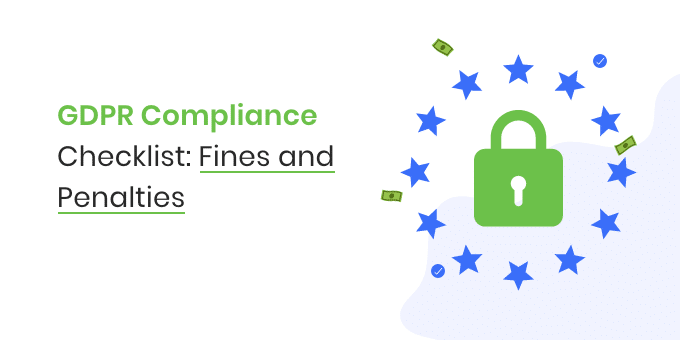One out of four organizations is a victim of a data breach, according to the Cost of Data Breach Study: GDPR Compliance Checklist Global for 2017 by the Ponemon Institute.
So is it only a matter of time before every data controller will be shelling out millions to stay in business?
GDPR fines and penalties are deliberately prohibitive. There is no doubt about it. But with 25% of the organisations being hit by data breaches being careless with user data is no longer an option. Does this mean that the growth of data-based technologies, such as big data and data analytics, is being smothered by the General Data Protection Regulation (GDPR)?
That is not exactly true. All GDPR is doing is disincentivizing companies for being careless with their data. Everything from data collection, processing, to storage has to be secured using the latest available technologies.
Here is a quick summary of GDPR fines and the conditions under which they will be applicable.
Coming to the fines
Article 83 of the General Data Protection Regulation (GDPR) talks about the fines and penalties in detail and requires these to be “effective, proportionate and dissuasive”. The GDPR follows a multi-tiered structure for the administrative fines. All such fines and penalties are not mandatory.
So, the supervisory authority need not levy one or more of these. But, they can collect these if they find it a suitable punishment for an offence. What this means is that these fines are discretionary. Also, they are levied on a case by case basis.
Is Your Business GDPR-Ready?
With Seers GDPR Audit, compliance has never been easier. Our Solution makes compliance easy so you can focus on what matters.
- Avoid penalties with a comprehensive audit.
- Keep your business compliant with up-to-date GDPR practices.
- Build trust with your audience by ensuring their data is safe.
- Fast, efficient, and hassle-free GDPR audits at your fingertips.
Why such hefty fines?
The compliance requirements of GDPR are pretty elaborate. Organisations will have to invest in infrastructure and training to ensure compliance. Policymakers had to give the organisations a strong enabler to get them to comply with such a regulation. The fines are the most compelling reason why organisations are so invested in making sure that they comply with the new regulation.
Structure of GDPR Fines: The Two-Tiered System
The GDPR employs a two-tiered system for fines. The severity of the offence determines which tier applies. This system aims to ensure proportionality and fairness, meaning that the punishment fits the crime, but still holds companies accountable.
Lower Tier Fines:
The maximum amount for these fines is €10 million, or 2% of the business’s yearly global revenue, whichever is greater. Usually, they are applied to less serious infractions like neglecting to keep internal data records or failing to alert supervisory authorities to a data breach.
Higher Tier Fines:
These fines are significantly steeper, reaching up to €20 million or 4% of the company’s annual global turnover. This fine is applicable when the company does not comply with the regulations listed in Article 83(5) of the GDPR document.
These are saved for more severe violations, such as processing data without a justifiable reason or processing data in violation of fundamental data rights principles. (e.g., processing data without legal justification).
What Triggers a GDPR Breach Fine?
Understanding what constitutes a GDPR violation is crucial. Here are some common culprits:
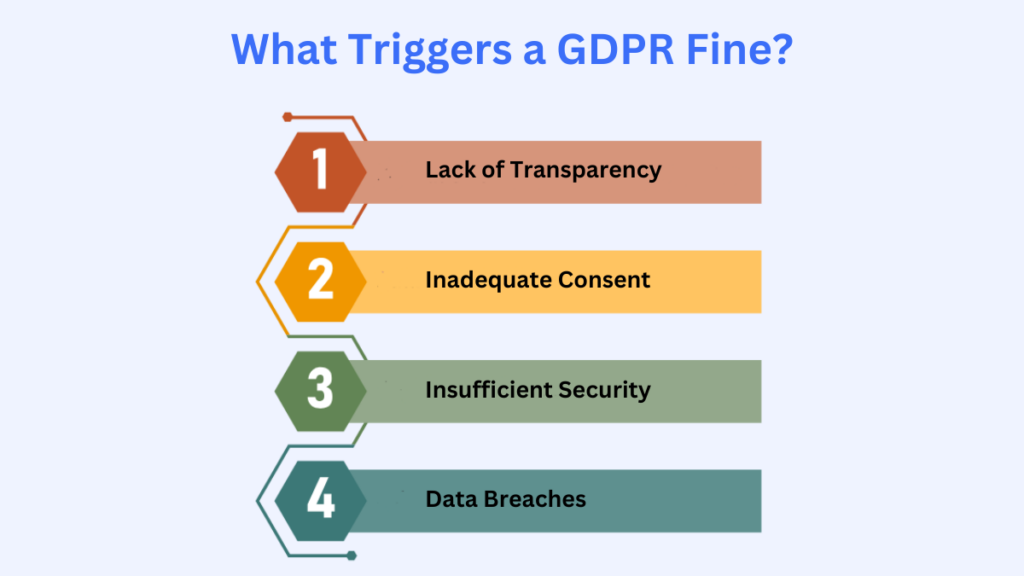
-
- Lack of Transparency: Not providing clear and concise information about data processing practices.
-
- Inadequate Consent: Failing to obtain valid, informed consent for data collection.
-
- Insufficient Security: Implementing security measures that are insufficient to protect personal data.
-
- Data breaches: Failing to notify authorities and data subjects promptly in case of a breach.
How Are GDPR Fines Calculated?
One of the most frequently asked questions is how these fines are calculated. The calculation isn’t arbitrary; it’s based on several factors:
-
- Nature and gravity of the infringement: Authorities consider how severe the violation is.
-
- Intentional or negligent character: Was the breach intentional, or was it a result of negligence?
-
- Actions taken by the company: Did the business notify the authorities of the breach promptly and assist them?
-
- History of non-compliance: Higher fines will result from recidivism.
-
- Type of personal data affected: More severe fines will be applied to sensitive data, such as financial or health information.
Small Businesses and GDPR Fines
Do not let size deceive you. The GDPR applies to all organisations processing personal data of EU citizens, regardless of location.
While it’s true that big companies often face more significant fines, small businesses are not exempt. In fact, many small and medium-sized enterprises (SMEs) have been penalised for GDPR violations.
One of the reasons small businesses struggle with GDPR compliance is due to limited resources. They can be more susceptible to breaches since they lack the same infrastructure for data protection as larger well-known businesses.
Nonetheless, when determining fines, GDPR authorities frequently take the company’s financial situation into account. So, compliance is key whether you’re a one-person shop or a multinational corporation.
Example: A Small Business Case
A modest Polish business that neglected to notify customers of their data rights was fined €22,000 in 2020. Even though this is a far lesser amount than the penalties assessed on Meta or Amazon, a small firm would still be severely penalised.
Are GDPR Fines on the Rise?
Since GDPR’s implementation in 2018, fines have steadily increased. The cumulative fines issued between 2018 and 2022 surpassed €1.6 billion, with 2023 showing no signs of slowing down. European regulators are ramping up enforcement, particularly in areas like consent management and cross-border data transfers.
This trend suggests that businesses can expect even stricter scrutiny in the future. Non-compliance is simply not an option anymore, as authorities continue to issue higher fines and conduct more frequent audits.
What are the minimum and maximum fines for GDPR non-compliance?
The minimum fines generally start from €10,000 for smaller infringements, while the maximum can reach up to €20 million for severe violations. However, depending on worldwide turnover, the penalties may be larger in situations similar to Meta’s.
Top 12 Examples of GDPR Fines For Non-Compliance From 2018-2023
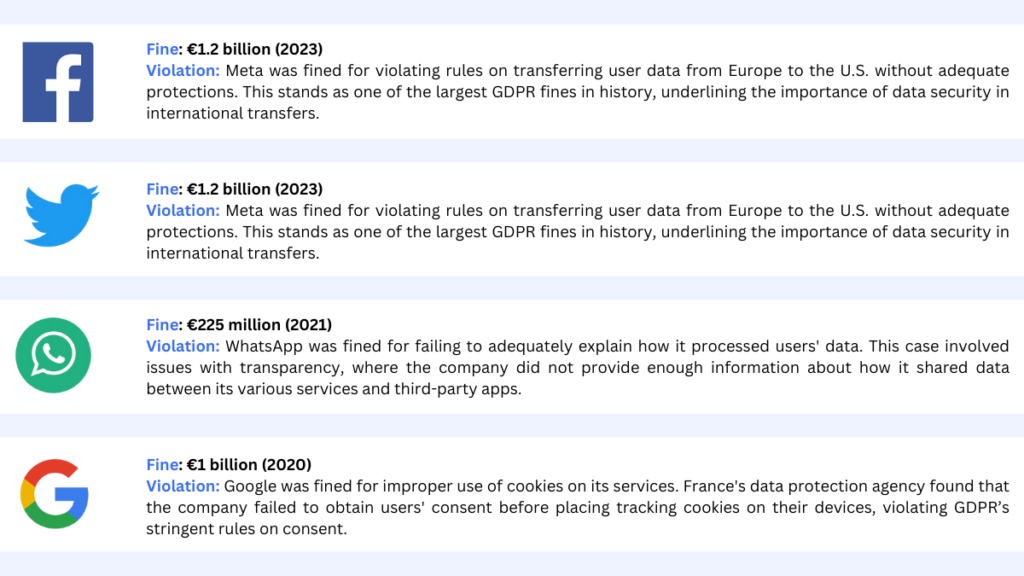
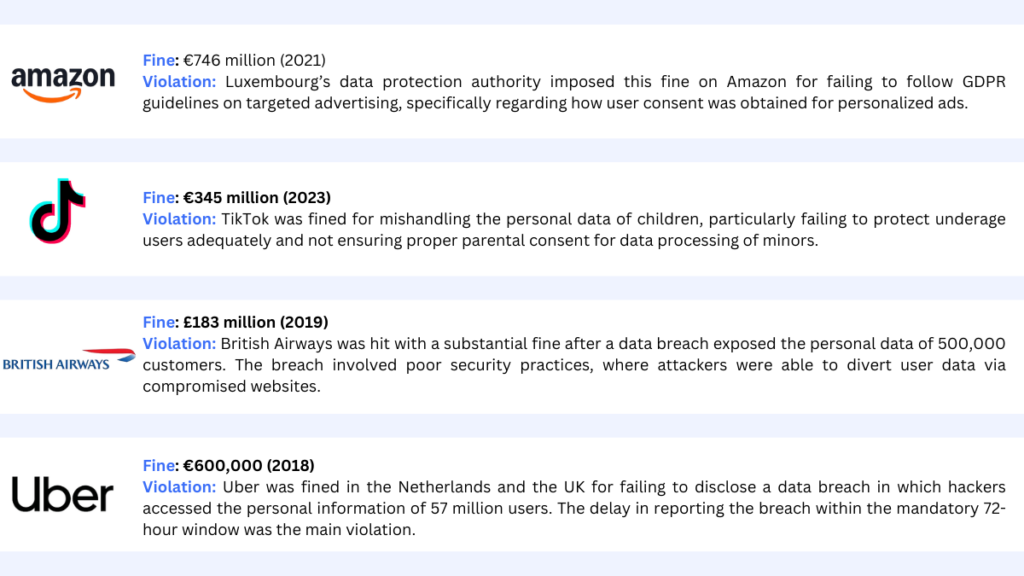
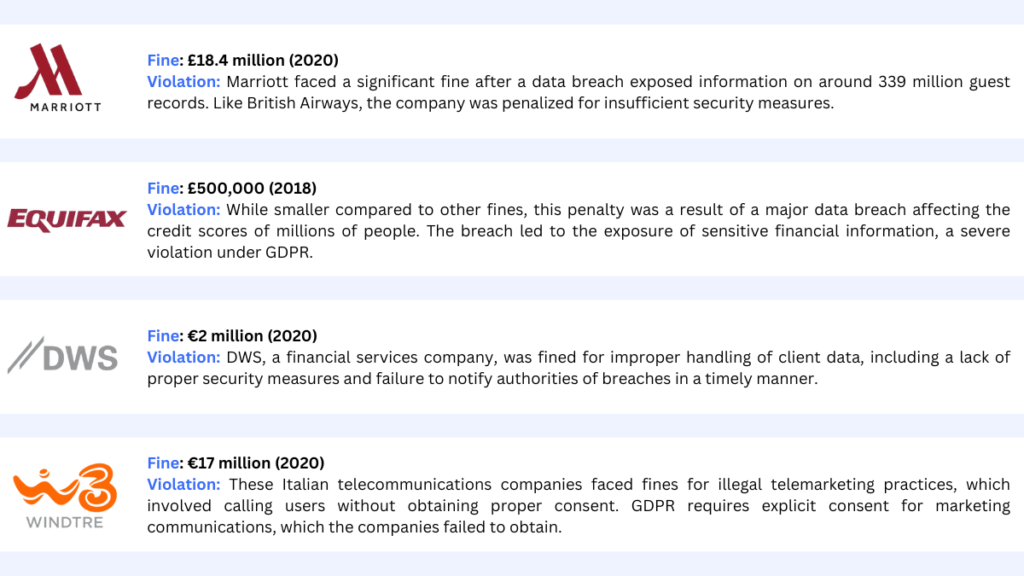
How to Avoid GDPR Fines and Penalties
No business wants to face hefty fines, The good news is that there are actions you can take to avoid paying large fines, even though no firm likes to face them. Here is a checklist to assist your company in maintaining compliance:
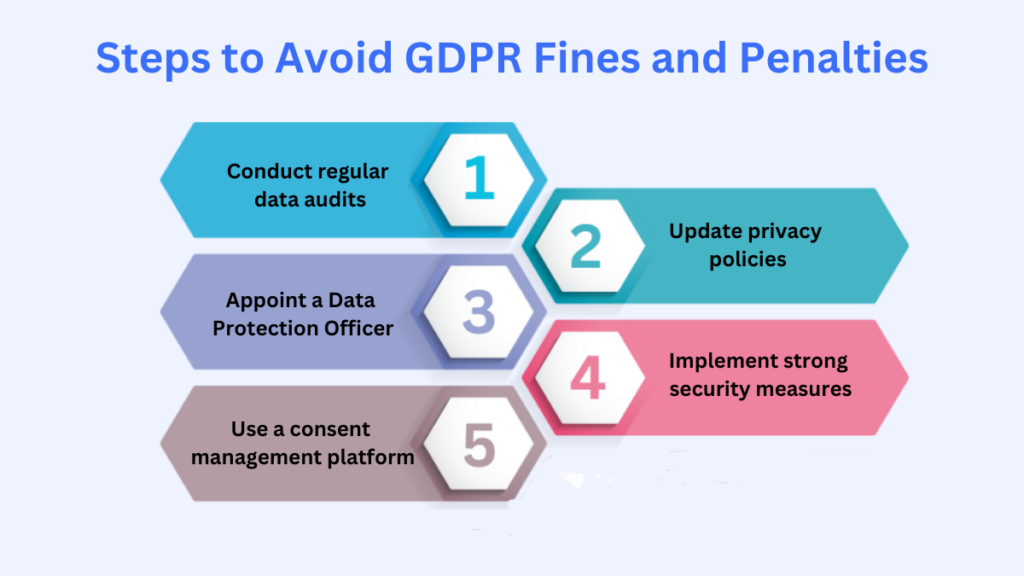
-
- Conduct regular data audits: Organisations need to ensure that they conduct regular GDPR audits. Understand what data you’re collecting, why you’re collecting it, and how it’s being processed.
- Update privacy policies: Ensure your privacy policies are clear, concise, and reflect current data processing practices.
- Appoint a Data Protection Officer (DPO): Seek advice from data protection officers/ privacy experts in case of data breaches
- Implement strong security measures: Ensure all customer data is encrypted and securely stored.
- Use a consent management platform (CMP): Tools like the Seers consent management platform help ensure that you collect valid consent in compliance with GDPR.
How to Start Your Compliance Journey
For businesses looking to get started on their GDPR compliance journey, the best approach is to build a strong foundation. Here are the steps you can take:
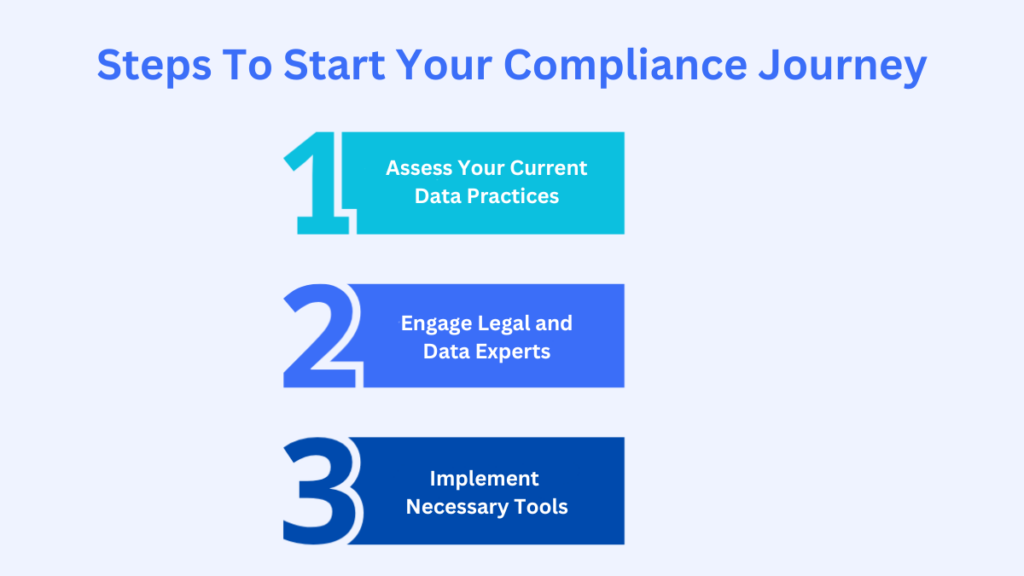
-
- Assess Your Current Data Practices: Conduct a thorough audit of how you collect, store, and use personal data.
- Engage Legal and Data Experts: Consider hiring a GDPR consultant or using a platform like Seers to simplify compliance.
- Implement Necessary Tools: From consent management platforms to data encryption, invest in the tools that will keep your business compliant.
Seers: Your Partner in Avoiding GDPR Fines
Seers Overview:
- Seers offers a robust GDPR compliance solution that ensures your business is fully protected from costly penalties. Our tools help identify risks, optimise data protection, and keep you ahead of regulations.
Founding Purpose:
- Seers was created to help businesses avoid the stress of GDPR non-compliance, reducing the risk of hefty fines and ensuring a smooth compliance journey.
Passion and Motivation:
- We are dedicated to simplifying GDPR compliance, empowering businesses to focus on growth while ensuring privacy and data protection.
What We Offer:
- An advanced GDPR Audit Tool for complete compliance checks.
- Custom training programs to equip your team with data privacy knowledge.
- Seamless integration to keep your business secure and compliant.
Protect your business from GDPR fines with Seers today!
Book Your Demo NowDon’t wait until a hefty fine lands on your doorstep. Take action today! GDPR fines and penalties are a serious matter for businesses of all sizes. While large companies like Meta and Amazon may grab headlines, small businesses are equally at risk of facing financial and reputational damage. The key to avoiding these penalties is to take proactive steps to ensure compliance.
FAQs
While GDPR is an EU-wide law, enforcement varies across member states. For example, Germany and France have been known for imposing stricter penalties, while other countries may show more leniency.
Even unintentional breaches can lead to fines, but businesses may reduce their liability by reporting the incident promptly. Fines for unintentional breaches often depend on how quickly the company took steps to mitigate the damage.
In the 5th edition of the GDPR Enforcement Tracker Report of 1 March 2024, a total number of 2,086 fines have been recorded in the CMS Enforcement Tracker database.
GDPR fines are most likely to go to the respective local government or regulators and are used for public funding.
